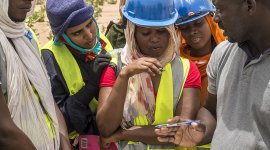Managing a just transition to environmentally sustainable economies and societies

Online
Managing a just transition to environmentally sustainable economies and societies
Low-carbon and climate-resilient development
25 May–5 June 2020
The course is available in English
Since the adoption of the Paris Agreement in 2015 – whose preamble explicitly refers to the just transition – countries are striving to manage the transition to sustainable economies in a fair and productive way. Reconciling decarbonisation of the economy with social justice is not an easy task. While the greening of economies brings many opportunities to achieve social objectives, the required economic restructuring also presents enormous challenges for enterprises, workers and the economy at large.
Key features
Learn differently
The Centre’s training methods include group exercises, simulation activities, and study visits
High-level resources
Learn from ILO specialists, ITCILO trainers, and external lecturers
Proven procedures
This course is based on ILO-recognized strategies and standards
Introduction to the course
This course seeks to strengthen institutional and individual capacities to support a just transition to environmentally sustainable economies and societies. Participants will acquire knowledge and tools to help them understand the sustainable development framework, in particular the link between environmental challenges and the world of work. It will focus on the ILO Guidelines for a Just Transition: a framework and practical tool for tackling the employment and social dimensions of sustainable development, climate change and other environmental challenges. The course is an opportunity to review concepts, global practices and national experiences, with the aim of understanding the main policy areas of the Guidelines and giving them practical effect at country, sector and local level.
Who attends this course?
Representatives of ministries of labour/employment and social partners, as well as government officials from other ministries (e.g. environment, planning, finance); national and international development agencies; climate change commissions, institutions and coalitions; environmental agencies; civil society organizations and academia. Gender-balanced participation is desirable.
What topics does this course cover?
This course seeks to strengthen institutional and individual capacities to support a just transition to environmentally sustainable economies and societies, linking three topics:
- Green jobs
- Just transition
- Social justice
Course content is guided by the ILO Guidelines for a Just Transition: a framework and practical tool for tackling the employment and social dimensions of sustainable development, climate change and other environmental challenges.
What will I learn?
Participants will acquire knowledge on the sustainable development framework, in particular the link between environmental challenges and the world of work. The course is an opportunity to review concepts, global practices and national experiences in promoting a just transition. Participants deepen their knowledge of the key topics with the guidance of international development experts:
- How the environment and the world of work are linked within the sustainable development framework
- Global best practices on policies reconciling the transition to the green economy with inclusive job-rich growth
- Case studies and lessons learnt from countries applying just transition principles and strategies
What will I be able to do?
This course enables participants to develop solutions to complex problems, creating
more sustainable societies:
- Use international guidelines to manage the transition to low-carbon economies
- Develop and implement effective policies and strategies to create decent jobs in the green economy
- Develop just transition initiatives based on international good practices and lessons learnt


